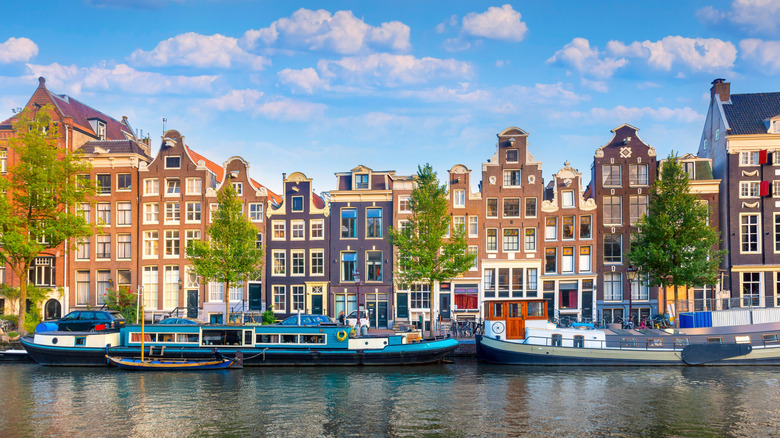Rick Steves Has One Grim Reminder For International Tourists Complaining About The European Heat
It seems like every year headlines across the world talk about "record-breaking temperatures" or some similar phrase. Wildfires have recently cropped up like Spain and Greece as temperatures soar above 40 degrees Celsius (104 degrees Fahrenheit). Last year, 2024, was already the hottest European year on record, with 2023 was the second-warmest. Meanwhile, the entire span from 2015 to 2024 were the 10 hottest years ever recorded, globally. What should Europeans in largely non-air-conditioned buildings do? Or, going further, how about travelers complaining about European heat? On that last note, travel author Rick Steves on his website relates a truth that's as sobering as it is necessary to hear: Flights to Europe won't help reduce our collective carbon footprint or the resultant heat.
While not a perfect way to understand the complexities of greenhouse has emissions, carbon footprints at least help people, organizations, businesses, and governments maintain some measure of accountability when confronted with the effects of ongoing climate change. Simply put, carbon footprints measure direct emissions into the air (like cars) combined with indirect emissions (like electricity) to produce a final sum measured in tons of carbon dioxide. And while flights only account for 2.5% of the world's carbon dioxide tonnage, The Guardian explains that a single, roundtrip transatlantic flight from New York to London can generate more carbon dioxide per person than individuals in some countries use per year. And, only 10% of the world's population takes flights at present. Each one of those individuals contributes to rising temperatures.
That being said, Rick Steves doesn't recommend just not traveling. This is a matter of personal choice. Rather, he has some tips about how to offset your carbon footprint once you've arrived in Europe, and to beat the heat by choosing certain destinations.
Beating the heat and carbon footprint on a European trip
As usual, Rick Steves has some wonderfully common sense advice for folks traveling to Europe who think it's too hot. Namely: Go to a cooler area in summertime. Stay away from the hotter, often Mediterranean areas like Greece and its already-overtouristed islands like Santorini and show some love to Europe. Places like the Netherlands, which are often cloudy, rainy, and cool, transform into a temperate paradise in summer. Check out an off-beat neighborhood in Amsterdam like De Pijp or venture out to one of Steve's favorite Netherlands towns, the less-crowded "mini-Amsterdam" of Delft, where you can pick up some lovely Delft Blue ceramics. Or, go further north to Denmark, Norway, Sweden, Finland, or even Iceland, which Steves recommends visiting in summer, anyway, rather than enduring its punishing winter. Going to cooler areas also will naturally reduce your carbon footprint because you won't be cranking the A/C in your hotel (if you've booked that kind of lodging).
On the carbon footprint front, Steves points out that Europe is already an extremely eco-conscious place. There are way more opportunities to bike in many European countries (speaking of the Netherlands) or to use trains, which produce less carbon dioxide than planes. They also don't come with an annoying airport trip, check-in and security, or wasted time waiting at gates.
In an effort to preserve global travel and the environment, Steves has actually gone so far as to launch a Climate Smart Commitment program, which incurs a small, $30 travel tax on folks using his tours. In this way, he's garnered and donated $4 million to farmers in developing countries since 2019. Certainly, the rest of us can do our part, too.

